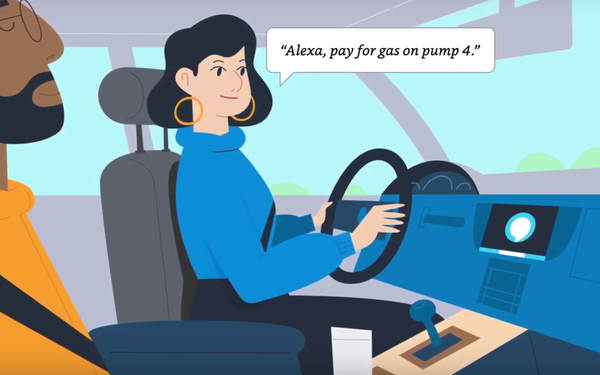Alexa Will Help Fill Your Gas Tank — But Still Won’t Clean Your Windshield

Some Exxon and Mobil customers stopping to fuel up will soon be able to tell their Alexa-enabled vehicles or mobile devices to “Fill‘er up!,” with the cost of the transaction automatically added to a credit card using Amazon Pay.
The new service is being organized by digital commerce technology firm Fiserv, a provider of payments and financial services technology solutions. When it gets rolling sometime this year, Alexa will go to work at 11,500 Mobil and Exxon stations in the U.S. In the big picture the service becomes another task virtual assistants are helping provide.
In practice, at least as depicted in an animated slide show, a customer needing to refuel would stop at a station and from the vehicle tell Alexa to “pay for gas at pump 4.” The voice assistant would ask you to confirm you’re at the same service station it thinks you are, and then activate the pump.
After that, you’re on your own. Alexa is not a full-service kind of gal at this point. You still have to pump the gas. In bad weather, though, beginning the process from the comfort of your car is a plus. The cost of the transaction is automatically added to a credit card Amazon already has on file.
“As consumer expectations change, there is growing demand for frictionless interactions that span the digital and physical worlds,” said Devin McGranahan, senior group president, global business solutions at Fiserv, which showed off the device at the CES show this week in Las Vegas. “The age of connected commerce is here, and voice-activated smart devices will play a pivotal role in the future of payments by streamlining the way consumers make purchases every day.”
These are early days for the service but the slide show — designed to deliberately dumb-down the buying process — shows seven commands, questions, responses or instructions from either Alexa or the driver, before even a drop of unleaded enters the tank. Presumably, it will be a lot quicker in real life over time.
A long list of automakers are now offering Alexa, but not in all of their models, and Alexa is widely plugged into smartphones and on-the-go device like earbuds. Marketers believe AI helpers will increasingly help consumers perform tasks and no doubt along the way continue to collect data so she can offer other kinds of help in the future.
The research firm eMarketer predicts that by some date this year, voice assistants will break the 100 million-in-use threshold. Capgemini Research Institute estimates 73% of consumers will be using voice assistants in a car two years from now, so it would appear Exxon/Mobil and Fiserv aren’t leaping far ahead of consumers.
In fact, General Motor began offering in-car gasoline pay in some 2018 models, working with Shell Oil. Consumers get a three digit code on their infotainment system to empower the right pump. The cost of the transaction is automatically billed to their credit card, and loyalty points are automatically tallied as well. Customers using the GM system can book hotel rooms or order food — a logical next frontier for Alexa’s in-car assistance.
(19)